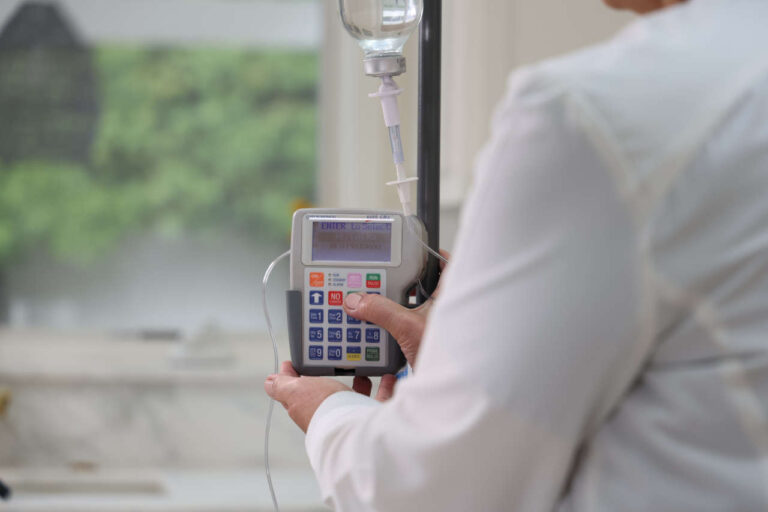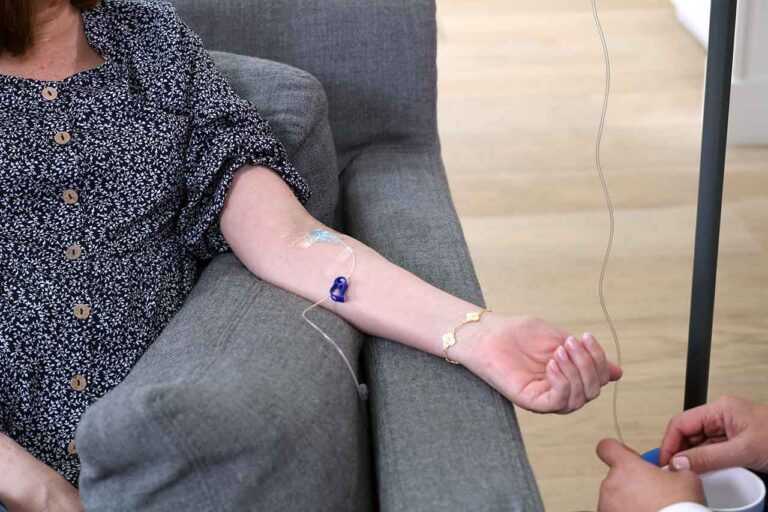
Imunoglobulina (pronunțată [i MYUN GLOB yoo lin]) este cunoscută și sub denumirea comercială Panzyga. Este disponibilă și sub alte denumiri comerciale, cele mai comune fiind Cuvitru, Gammagard, GamaSTAN, Gammaked, Gamunex-C, Hizentra, Hyqvia, Octagramși Privigen, among many others. Immune globulin is a blood product derivative. Treatment with immune globulin is typically referred to as IVIG (intravenous immune globulin).
Obțineți autorizație prealabilă pentru IVIG
Cum se utilizează Panzyga?
Panzyga a fost aprobat de Administrația pentru Alimente și Medicamente (FDA) for males to treat many different types of cancers, including breast, head/neck, lung, cervical, prostate, bladder, ovarian cancer, and many more. It can be prescribed alone or with other medications simultaneously. Immune globulin contains IgG antibodies capable of opsonizing and neutralizing microbes and toxins. Immune globulin can be used for a wide variety of different conditions and diseases; however, the brand Panzyga is specifically used to:
- Tratamentul trombocitopeniei imune (PTI)
- Treat chronic inflammatory demyelinating polyneuropathy (CIDP)
- Preveniți hipogamaglobulinemie (prin oprirea sau reducerea severității altor infecții la persoanele cu un sistem imunitar slăbit)
Formulări disponibile
Panzyga este disponibil doar ca soluție pentru perfuzie intravenoasă. Este disponibil în multe dimensiuni diferite, inclusiv 10 ml, 25 ml, 50 ml, 100 ml, 200 ml și 300 ml. Conține o concentrație de 100 mg/ml.
Directions for Use
IVIG infusion can be administered as fast as 2 hours or as long as 24 hours, depending on disease state and severity. It should be administered in a separate infusion line from other medications. If a primary line is being used, flush with normal saline (NS) or dextrose 5 % in water (D5W) prior to administration. Decrease dose, rate, or concentration of infusion in patients who may be at risk of kidney failure.
Panzyga dose varies depending on the disease state it is being used for. Typically, if the initial 30 minutes of the infusion is well-tolerated, the rate can be increased every 15 to 30 minutes as needed up to a maximum rate. Decreasing the rate or stopping the infusion may help relieve some adverse effects (flushing, changes in pulse rate, or blood pressure). Check with your physician about the rate and dose as well as the maximum rate allowed.
Missed Dose
This medicine needs to be administered on a fixed schedule. If you miss a dose, notify your doctor, home health caregiver, or treatment clinic.
Storage
Panzyga can be stored in the refrigerator for up to 36 months from the date of manufacture. Within this time, it may be stored for up to 12 months at room temperature. Once the medication has been removed from the refrigerator and left at room temperature, it must be used or discarded. Do not return back to the refrigerator. It is recommended to remove it from the refrigerator prior to infusion. Store away from direct sunlight.
What To Avoid While Taking Panzyga?
În timp ce urmați terapia cu Panzyga, trebuie să respectați câteva precauții. Informați întotdeauna medicul despre orice medicamente pe care le luați deja. Nu luați niciun medicament (chiar și plante medicinale, vitamine sau medicamente fără prescripție medicală) fără acordul prealabil al medicului sau farmacistului.Este posibil să aibă unele interacțiuni semnificative cu Panzyga.
Obțineți asistență pentru coplată IVIG
Vorbește cu un specialistPregnancy and Panzyga
Use of Panzyga may not be recommended if the patient is pregnant or breastfeeding. It could be potentially harmful to the fetus during pregnancy or to the infant while breastfeeding. It may be administered during pregnancy or while breastfeeding, but only if the potential maternal benefit outweighs the potential fetal risk. Consult with your physician if you think you may be pregnant or if you are breastfeeding.
Efecte secundare
As with any other medication, you may encounter side effects while taking Panzyga. A few things to remember are:
- You may not have all the side effects listed below. Many people may experience little to no side effects.
- The severity of side effects may vary from person to person, so don’t compare your side effects with other people’s experiences.
- Most of the side effects will improve when therapy is discontinued.
- These side effects are easily manageable most of the time, either by readjusting the dose of Panzyga or using additional medications to treat the symptoms. Consult with your physician or pharmacist to explore available options.
- Do not hide any symptoms; if you feel any discomfort, do not hesitate to tell your physician or pharmacist about it.
Note: This is not a comprehensive list of all side effects. Talk to your doctor if you have questions.
Some of the more serious side effects of Panzyga are listed below:
Allergic Reaction/Hypersensitivity
There have been cases reported of patients with allergic reactions to the Panzyga injection or any of its components. In addition, worsening asthma has been reported with therapy in patients with a history of asthma, sinusitis, or allergies. Signs of an allergic reaction can include rash; hives; itching; red, swollen, blistered, or peeling skin with or without fever; tightness in the chest or throat; wheezing; trouble breathing, swallowing, or talking; unusual hoarseness; or swelling of the mouth, face, lips, tongue, or throat. If you are experiencing any of these symptoms, seek emergency medical attention immediately. Immune globulin may not be recommended in patients with IgA deficiency.
Aseptic Meningitis Syndrome (AMS)
AMS has been reported with immune globulin administration. It is an illness characterized by serous inflammation of a certain area of the brain, most commonly causing headaches and fever. It more typically occurs with high doses or rapid infusion. AMS may appear within several hours to 2 days following treatment and usually resolves within several days after discontinuation. Female patients or patients with a migraine history may be at higher risk for AMS.
Hematom
The risk of hematoma formation is high if the immune globulin is administered subcutaneously for the treatment of immune thrombocytopenia.
Hemoliză
Hemolysis is the destruction or rupture of red blood cells. Intravenous immune globulin has been associated with hemolysis and can rarely lead to kidney impairment/failure. The risk for hemolysis may be increased if receiving high doses either as a single administration or divided over several days. Risk is also increased with underlying associated inflammatory conditions or non-O blood type.
Ask an IVIG Specialist about Side Effects
Blood Composition
Panzyga may affect elements in the blood, for example, by increasing protein or depleting sodium in the blood.
Cardiac Complications
There is a risk that Panzyga may cause high blood pressure. It may typically present as a very bad headache or dizziness, passing out, or a change in eyesight. Less commonly, however, it can potentially lead to a condition called tromboză if high blood pressure is left uncontrolled. In order to reduce risk, adequate hydration is highly recommended before infusion. Elevated blood pressure should be controlled with medications to treat high blood pressure.
Infusion-Related Reactions
Risk for infusion-related reactions may be increased with initial treatment, when switching brands of immune globulin, or if treatment has been interrupted for more than 2 months. Infusion reactions may consist of fever and chills and may also include nausea, vomiting, pain, headache, dizziness, dyspnea, hypotension, rash, and weakness. If shortness of breath, swelling of the mouth or tongue, drop in blood pressure, or signs of infection occur, the infusion should be stopped immediately. If you experience a severe infusion reaction, the infusion can be re-attempted with appropriate premedications such as Tylenol or Benadryl.
Pulmonary Edema
Panzyga can commonly cause fluid retention (also known as edema) within the lungs. In addition to pulmonary edema, immune globulin infusions can potentially lead to severe respiratory distress, hypoxemia (decreased levels of oxygen in the blood), and fever.
Kidney Dysfunction/Failure
Short-term kidney dysfunction can rarely occur. Risk is increased in elderly patients, patients with preexisting kidney disease, diabetics, dehydrated patients, and concurrent users of other medications that may cause kidney harm. For those with higher risk, the dose, rate of infusion, and concentration of solution should be minimized. Adequate hydration prior to the infusion is highly recommended to minimize kidney damage.
Other common side effects may include:
- Durere oculară/vedere încețoșată
- Creșterea ritmului cardiac
- Căderea părului
- Amețeli/oboseală
- Amenia
- Dureri de spate/membre
- Disconfort stomacal
- Deshidratare
- Urine discoloration
- Chills/fever
Obțineți asistență pentru coplată IVIG
Asistență financiară IVIGPanzyga Dosing Information
Panzyga is available as: 10 ml, 25 ml, 50 ml, 100 ml, 200 ml, and 300 ml single-dose, ready-to-use vials at a concentration of 0.1 g/ml.
Panzyga is administered as an intravenous (IV) infusion only.
Imunodeficiența umorală primară (IP)
Dose: The dose is 300 mg/kg to 600 mg/kg once every 3 to 4 weeks.
Infusion Rate: The starting infusion rate is 1 mg/kg/min (0.01 ml/kg/min) for at least 30 minutes. If there isn’t any evidence of infusion-related reactions, the infusion rate can be slowly increased every 15 to 30 minutes to up to 14 mg/kg/min (0.14 ml/kg/min).
Chronic Immune Thrombocytopenia (ITP)
Dose: The dose is 1 g/kg once daily for 2 days.
Infusion Rate: The starting infusion rate is 1 mg/kg/min (0.01 ml/kg/min) for at least 30 minutes. If there isn’t any evidence of infusion-related reactions, the infusion rate can be slowly increased every 15 to 30 minutes to up to 8 mg/kg/min (0.08 ml/kg/min).
Polineuropatia demielinizantă inflamatorie cronică (CIDP)
Dose: The dose is 1 g/kg once daily for 2 days, then a maintenance dose of 1 to 2 g/kg every 3 weeks, which is divided into 2 daily doses over 2 days. Based on the response to Gamunex-C, continued maintenance treatment after 6 months might not be necessary.
Infusion Rate: The starting infusion rate is 2 mg/kg/min (or 0.02 ml/kg/min). If there aren’t any infusion-related reactions, the rate can be slowly increased to a maximum of 8 mg/kg/min (0.08 ml/kg/min).
Monitorizare Panzyga
Due to its many side effects, monitoring is an important part of managing Panzyga therapy. The following includes what you can expect with Panzyga use:
- Tensiunea arterială trebuie verificată periodic pentru monitorizarea cardiacă.
- Trebuie efectuate analize de sânge frecvente pentru a monitoriza rezultatele testelor de laborator, în special nivelurile de proteine și sodiu din sânge.
- Funcția hepatică trebuie monitorizată, în special la pacienții cu complicații hepatice preexistente.
- Panzyga may not be recommended in patients with severe liver impairment.
- Some Panzyga formulations contain alcohol; the non-alcohol formulation would be less harmful to the liver.
- Unele mărci de imunoglobulină (cum ar fi Panzyga) pot conține sorbitol; nu utilizați la pacienții cu intoleranță ereditară la fructoză (HFI). Symptoms of HFI include recurrent vomiting, abdominal pain, and lower blood sugar.
- Pacienții trebuie monitorizați pentru complicații cardiace, în special tromboză.
- Riscul de tromboză crește odată cu vârsta înaintată, imobilizarea prelungită, antecedentele de tromboză, utilizarea de estrogeni, catetere intravasculare și hipervâscozitatea (îngroșarea) sângelui.
- Pentru pacienții cu risc crescut, se recomandă administrarea în perfuzie a imunoglobulinei la doza și viteza de perfuzie minime posibile.
REFERINȚE:
- Immune Globulin. In: Lexi-drugs online [database on the Internet]. Hudson (OH): Lexicomp, Inc.; 2016 [updated 4 Mar 2022; cited 8 Mar 2022]. Available from: http://online.lexi.com.
- Immune Globulin. In: In Depth Answers [database on the Internet]. Greenwood Village (CO): IBM Corporation; 2017 [cited 2022 Feb 2]. Available from: www.micromedexsolutions.com.
- Immune Globulin-Ifas (Intravenous Route). https://www.mayoclinic.org/drugs-supplements/immune-globulin-ifas-intravenous-route/description/drg-20444036. Published February 1, 2022. Accessed March 2, 2022.
- Panzyga: Immune Globulin Intravenous- Human Solution. DailyMED. https://dailymed.nlm.nih.gov/dailymed/drugInfo.cfm?setid=68a5ee5f-0352-b3ae-3321-c0a22947a31d. Published 2021. Accessed March 5, 2022.
- Panzyga (IGIV): Uses, dosage, side effects, warnings. Drugs.com. (n.d.). Retrieved March 8, 2022, from https://www.drugs.com/mtm/panzyga<img-igiv.html













